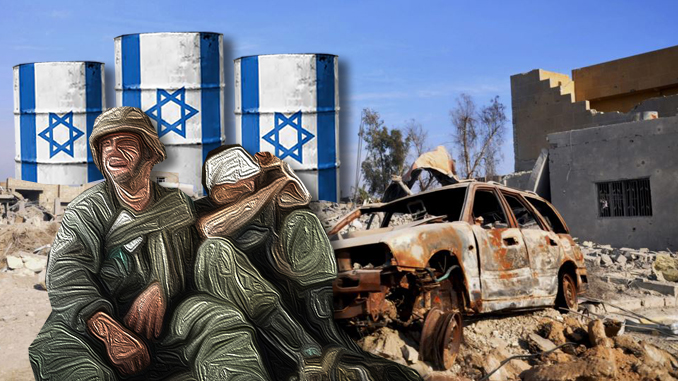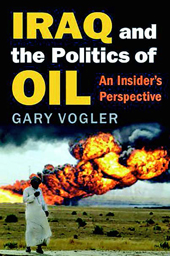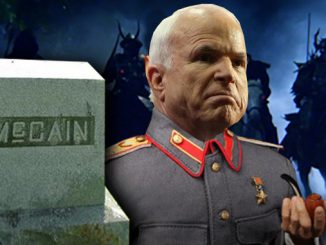
A new book by oil consultant Gary Vogler proves the U.S. waged war on Iraq to save Israel’s failing economy. “Neocons pushed so hard for war in large part because they intended to loot Iraqi oil on behalf of Israel.”
By Dr. Kevin Barrett
My 2008 book Questioning the War on Terror asked whether the disastrous U.S. invasion of Iraq in 2003 was a resource war or a Zionist war.
At that time, liberals and leftists regularly accused President George W. Bush and Vice President Dick Cheney of going to war for oil. “No blood for oil” was their protest chant.
It was obvious from day one that Iraq’s immense energy wealth had something to do with “Operation Iraqi Liberation,” but as sociologist James Petras has pointed out, the big oil companies were actually against the war. They would have preferred peace and stability—and Saddam Hussein was willing to give away the store if America would only take yes for an answer, as Susan Lindauer explains in her book Extreme Prejudice.
Petras, Stephen Sniegoski, and many others—including ex-CIA analysts Bill and Kathleen Christison in their 2003 article “Too Many Smoking Guns to Ignore: Israel, American Jews, and the War on Iraq”—have marshalled strong evidence that the Iraq invasion was about Israel, not oil.
The architects of the Iraq war were all Zionist neoconservatives. New York Times columnist Thomas Friedman explained in April 2003 that the war on Iraq was “the war the neoconservatives wanted. . . . I could give you the names of 25 people who, if you had exiled them to a desert island a year and a half ago, the Iraq war would not have happened.”
Iraq was one of the “seven countries in five years” targeted for destruction after 9/11, according to Gen. Wesley Clark. All seven were enemies of Israel. None posed any threat to the United States.
Israeli Prime Minister Benjamin Netanyahu, whose first reaction to the 9/11 attacks was “it’s very good,” still felt that way in 2008: “We are benefiting from one thing, and that is the attack on the Twin Towers and Pentagon, and the American struggle in Iraq,” Netanyahu insisted, according to a report in the April 16, 2008 edition of Israeli daily Ha’aretz.
9/11 and the subsequent American war against Muslim countries helped Israel in numerous ways. Besides “taking out” Israel’s enemies and balkanizing the Middle East in accordance with the Oded Yinon plan, the 9/11 wars also saved the Israeli economy, which in 2001 was on the brink of total collapse. As Naomi Klein writes in The Shock Doctrine (pp. 434-441), Israel was crushed by the dot-com crash, with 300 Israeli tech firms going bankrupt. During the run-up to 9/11, the Israeli government slashed social services to the bone and transferred all of its resources into “a slew of start-ups . . . specializing in everything from ‘search and nail’ data mining, to surveillance cameras, to terrorist profiling. When the market for these services and devices exploded in the years after Sept. 11, the Israeli state openly embraced a new national economic vision: The growth provided by the dot-com bubble would be replaced with a homeland security boom.”

Another way 9/11 and the 9/11 wars were designed to save Israel’s failing economy was recently revealed by oil consultant Gary Vogler. In his book Iraq and the Politics of Oil: An Insider’s Perspective. Vogler explains that the neocons pushed so hard for war in large part because they intended to loot Iraqi oil on behalf of Israel. As Douglas Feith’s former law partner Mark Zell explained, the neocons believed the boastful promises of wannabe puppet dictator Ahmed Chalabi:
“He said he would end Iraq’s boycott of trade with Israel and would allow Israeli companies to do business there. He said the new Iraqi government would agree to rebuild the pipeline from Mosul in the northern Iraqi oil fields to Haifa.”
As it turned out, the Mosul to Haifa pipeline was a non-starter. But Chalabi did succeed in stealing Iraqi oil and passing it to Israel at bargain basement rates, by forcing Iraq, against the wishes of almost all Iraqis, to sell oil to convicted swindler Marc Rich’s company Glencore, which has provided almost all of Israel’s oil since 1973.
And though Vogler doesn’t discuss ISIS and Kurdish black market oil sales to Israel, it appears that these and other methods have been used to leverage Iraqi oil to pump up Israel’s failing economy, which only survives thanks to trillions of dollars of tribute coughed up by American taxpayers.
Vogler ends his book with a warning: “The costs to the United States for invading Iraq were huge” (4,489 U.S. troops killed and 32,223 injured, over 134,000 Iraqi civilians and 150 reporters killed, 2.8 million refugees, $2 trillion wasted) “We cannot allow another group, such as the neocons, to push our country into a costly and unnecessary Middle Eastern war as they did in Iraq.”
Kevin Barrett, Ph.D., is an Arabist-Islamologist scholar and one of America’s best-known critics of the War on Terror. From 1991 through 2006, Dr. Barrett taught at colleges and universities in San Francisco, Paris, and Wisconsin. In 2006, however, he was attacked by Republican state legislators who called for him to be fired from his job at the University of Wisconsin-Madison due to his political opinions. Since 2007, Dr. Barrett has been informally blacklisted from teaching in American colleges and universities. He currently works as a nonprofit organizer, public speaker, author, and talk radio host.




Your right on the money with this report…
Dr. Barrett, I wish there were more like you who report on how evil forces in the US and Israel have caused all the problems we are facing in the world today. And it is all part of an agenda the elite is pursuing to establish a New World Order. Dumbing down the population with filth and mass-sport will only accelerate their master plan.